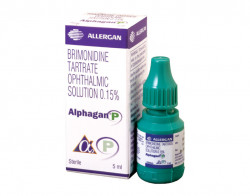Alphagan (brimonidine) Coupons, Discounts & Cost
Alphagan (brimonidine) is a drug that is used to effectively reduce intraocular pressure in people who have open-angle glaucoma. One way to save money on the Alphagan (brimonidine) retail cost regardless of income and insurance status is to use Alphagan (brimonidine) coupons or discount cards from RXCoupons. Use our Alphagan (brimonidine) coupons at your online pharmacy and receive up to 75% off the sale price each time you refill your prescription.
What is Alphagan (brimonidine)?
Alphagan (brimonidine) is a drug that is used to effectively reduce intraocular pressure in people who have open-angle glaucoma.
The main active substance of the drug is brimonidine tartrate. This component determines the therapeutic efficacy of Alphagan ophthalmic drug. The drug is available in plastic bottles.
Alphagan drops work well among those people who have problems with high eye pressure and glaucoma. The drug reduces eye pressure and has a positive effect on the patient’s overall eye health. It is used to treat high intraocular pressure as monotherapy or in combination with other agents that reduce intraocular pressure.
Drug dosage
Alphagan (brimonidine) ophthalmic solution is applied as follows: use one drop three times a day. If you use other ophthalmic drugs that reduce intraocular pressure, instill them with a 5-minute interval.
What should you know about Alphagan (brimonidine) contraindications?
The main contraindications for Alphagan (brimonidine) are the following: - Hypersensitivity to the components of the drug (which can rarely develop in some patients); - Co-administration with monoamine oxidase inhibitors (MAOIs) (often prescribed in neurological and psychiatric practice); - Pregnant women; - Nursing mothers; - Children younger than 2 years of age; - Patients with body weight less than 20 kg.
What should you know about Alphagan (brimonidine) side effects?
Almost all medications have side effects. If the drug causes severe side effects, you should stop using it and consult a doctor.
Systemic and local side effects of Alphagan (brimonidine) include: swelling and redness of the conjunctiva, blurred vision, sensitivity to light, tear fluid formation, headache, dizziness, weakness, drowsiness, hypertension or hypotension, respiratory failure, cough, skin rash, high cholesterol levels, and some others.
CNS: headache, drowsiness, insomnia, dizziness.
Cardiovascular system: high blood pressure, bradycardia, tachycardia.
Respiratory system: bronchitis, cough, rhinitis, sinusitis, shortness of breath, dry mouth, apnea.
Digestive tract: gastrointestinal disorders, nausea, dyspepsia.
Skin and subcutaneous tissue: rash, erythema, itching, swelling of the face.
Other reactions: allergic reactions, hypercholesterolemia, asthenia, fatigue, low blood pressure, hypothermia, hypotonia, iritis, allergic conjunctivitis, follicular conjunctivitis, blepharitis, cataract, swelling of the conjunctiva, eye irritation, keratitis, photosensitivity, decreased visual acuity.
If you accidentally take the drug inside, you will have the following symptoms: CNS depression, drowsiness, loss of consciousness, low blood pressure, bradycardia, cyanosis, apnea.
What should you know about Alphagan (brimonidine) special instructions?
Special instructions for Alphagan (brimonidine) are as follows:
- It is not recommended to wear contact lenses while on Alphagan therapy. - Caution should be exercised when treating patients who have the following disorders: orthostatic hypotension, cerebrovascular accident, kidney failure. - Alphagan should be used with caution with drugs that suppress the central nervous system (alcohol, barbiturates, opium derivatives, sedatives, agents used for general anesthesia), antihypertensive drugs and cardiac glycosides, tricyclic antidepressants. Note that if you are taking two or more drugs, they can either weaken or strengthen each other's action. - Do not touch the dropper tip with your hand when using Alphagan ophthalmic drops. - Alphagan drops may be used with other drugs (with an interval of 15-20 minutes for eye drops). - If the treatment protocol was ineffective, it is necessary to consult an ophthalmologist to decide on the further use of the drug. - The drug should be stored at a temperature of no more than 20-25 °C.

